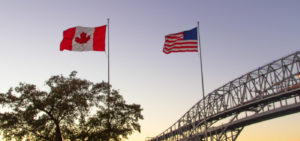Since March of last year, the US-Canadian border has been closed. With summer quickly approaching, the question lingering on the minds of many US and Canadian citizens is: “When will the border open?”
US-Canada Travel Restrictions
Currently, only essential travel is allowed for US citizens traveling into Canada, and anyone entering (including Canadian citizens) must have a negative COVID-19 test, fill out their arrival/quarantine information via ArriveCan, and quarantine for 14 days.
Canadians wanting to travel to the US can do so by airplane, but not by car. Any Canadian entering the US must have proof of a negative COVID-19 test within 72 hours of entering the country. Yesterday, it was announced that starting July 5, fully vaccinated Canadians will not have to quarantine upon re-entering the country, although they will have to provide a negative COVID-19 test. There still has been no announcement on when fully vaccinated Americans (or other nationalities) will be allowed to enter.
Related: Where Can Americans Travel Right Now?
Can Americans who Own Property in Canada Cross the Border?
Americans who own property in Canada are not even allowed to cross the border, which means there are people who have not been to their vacation homes in over a year. Mary Beth McGrath, an American citizen who owns property on Prince Edward Island (PEI), has been unable to visit her summer home since October 2019. She says she “can’t understand why fully vaccinated US citizens should not be allowed to cross into Canada, comply with any isolation or testing requirements, and check on their Canadian homes.”
McGrath adds “We are now fully vaccinated, and still cannot enter Canada. Our family has owned and paid property taxes on the cottage and land for fifty years, including last year.”
While Canadians are allowed to fly to the US for non-essential travel, they are not allowed to drive. The reason why is unclear. Some Canadian “snowbirds” have even gone so far as to ship their cars to the nearest border, fly into the US, and take a cab to pick up their cars. If the same rule applied to Americans wanting to fly to Canada, McGrath, who typically drives to her home, said that while the logistics might be tough, she and her husband would certainly consider flying, if allowed (although they wouldn’t go as far to ship their car). Even if they could do that, they would still need to depend on others to assist during their 14-day isolation period, which is particularly strict on PEI.
Related: What Countries Are Open to Vaccinated Travelers?
US-Canada Border Reopening Date
The question remains: when will the border be opening? Sadly, the answer is we don’t know, and neither do the authorities.
Senator Chuck Schumer visited Niagara Falls in May and urged both governments to open the border between the countries. In a letter to Homeland Security and the Department of State, he said he urged them to “work in coordination with your Canadian counterparts to finally develop a transparent, bilateral, and public plan based on public health data and guidance – with specific standards, protocols, and metrics – to safely reopen the Northern Border to non-essential travel. Similarly, I strongly urge you to negotiate an interim expansion of the essential travel designation to include the thousands of impacted New Yorkers, in addition to millions of other vaccinated American and Canadian citizens.”
As of this week, just over 64% of Canadians have received one dose of a vaccine, while 12.82% are fully vaccinated, a far cry from Americans, with 45% of the population fully vaccinated. This spring, Prime Minister Justin Trudeau hinted that there may be vaccine passport requirements for entering Canada, but we don’t know when that may be. Trudeau also said he hopes the border will be open for summer travel. As it stands now, the border is closed through July 21.
For people who live along the border, those wanting to vacation in Canada, as well as Americans with property in Canada like McGrath, that opening can’t come soon enough.
Editor's note: This story has been updated to reflect new information.






